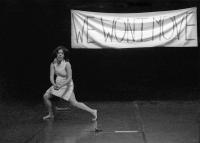 When Sarah Bergh and Sandra Chatterjee asked me to write some thoughts about Dance, Body and Protest, one of the first thing, that I remembered was one of my dance productions called Permanent Prints (1999), premiered at Kampnagel Hamburg. This production was a triptych, constituted of three different choreographic works, one of those pieces, we called it Duett, casted by myself and Cristina Moura. While the audience rushed into the theater space we would be on stage, sitting at a chair, looking at the audience, with an empty look, the set-design was a self-written banner hanging above our heads, on which we could read the statement „We won’t move“. My main concern was to bring up themes for reflection such as multicultural identities (today I would have used the terminology ‚body of cultures‘), gender, racism, sexism, and social political conflicts. Dancer and choreographer Angela Guerreiro has never performed unclothed in her solos or pieces; instead, she has addressed multicultural identity and gender issues, racism, sexism and (social) political conflicts in her work.
When Sarah Bergh and Sandra Chatterjee asked me to write some thoughts about Dance, Body and Protest, one of the first thing, that I remembered was one of my dance productions called Permanent Prints (1999), premiered at Kampnagel Hamburg. This production was a triptych, constituted of three different choreographic works, one of those pieces, we called it Duett, casted by myself and Cristina Moura. While the audience rushed into the theater space we would be on stage, sitting at a chair, looking at the audience, with an empty look, the set-design was a self-written banner hanging above our heads, on which we could read the statement „We won’t move“. My main concern was to bring up themes for reflection such as multicultural identities (today I would have used the terminology ‚body of cultures‘), gender, racism, sexism, and social political conflicts. Dancer and choreographer Angela Guerreiro has never performed unclothed in her solos or pieces; instead, she has addressed multicultural identity and gender issues, racism, sexism and (social) political conflicts in her work.
Stages
28.03.2023 | by Angela Guerreiro